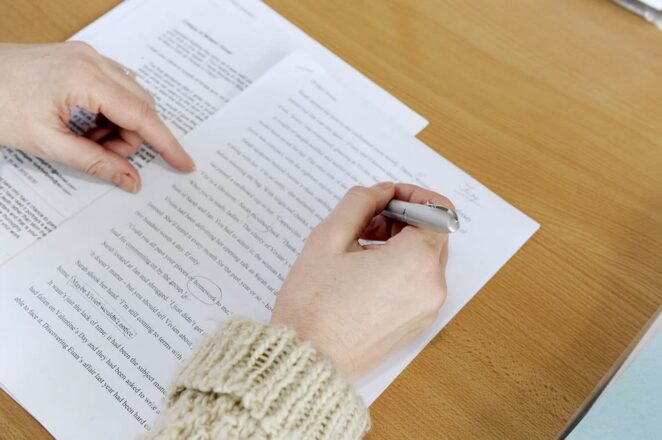Editing is that element of writing where we overview the written content and transform the written material so that anything irrelevant, inappropriate, or grammatically incorrect is avoided, deleted, or rectified to make the content legible and impactful to the reader.
The importance of editing a text can’t be understated, especially in academic writing, because it directly influences the writer’s credibility.
Aspiring to be a good writer is synonymous with becoming a better editor, as both require the deployment of certain unique skill sets and the assistance of digital tools to mark your writing with the stamp of quality that separates the seasoned pro from the amateurs.
Here are the most critical reasons that highlight the importance of editing a text which elevates academic writing to the level of an art form.
Brings Clarity to Writing

The writer may not notice but the written piece could be an incoherent flow of words or lacking in meaning or purpose, just a string of thoughts.
The importance of editing in journalism, for example, means you’ll minimize errors, eliminate wordiness, avoid passive voice usage, and bring crystal-sharp clarity in sentences, paragraphs, and structure.
Editing raises the bar beyond grammar, spelling, and errors, delivering a product that means what you intend and is something readers can relate to and understand.
Restructures the Writing
The active voice is prioritized in academic writing to eliminate ambiguity and bring more clarity to what the writer is saying.
By interchanging the author’s voice with a narrator’s voice, subtle corrections can be made in the tone of writing to ensure your target audience doesn’t miss the point.
The importance of editing lies in empowering the writer with the tools that downsize wordy sentences and lengthy paragraphs to make it easier for the reader to grasp complex concepts.
Reformats the Writing

In the era of digital writing and online reading, editing writing using the right font and the most suitable font style and size is critical to enhancing your content’s readability.
An article that is neatly styled and formatted is paragraphed at regular intervals and concise headings and subheadings with critical keywords positioned strategically will be convenient for readers to scan and assimilate.
Bullets and numbering represent an easy way of listing or highlighting notes in an abbreviated form for ease of the speed-reading public.
Transforms the Writing
If you’re asking what is editing in writing we could cite the example of apa editing services, a hugely empowering tool to perfect your content.
Many irrelevant materials can be substituted with credible citations, reasoned recommendations, references to peer research and reviews or anything relevant to the topic.
Academic writing rests on the shoulders of credibility, and one of the critical functions of editing is the plagiarism check. Fortunately, there are digital tools that do a review with consummate ease. Your final product will be unique, and your heroic endeavor will be hugely rewarded.
Editing exercises strict control over the word limit, brevity and clarity are much appreciated and projected, and obfuscation and needless wordiness are eliminated.
Guarantees a Better Product
When we write, it’s easy to lose sight of the reader’s point of view or the third-party perspective. Editing in writing process, though time-consuming, brings a cohesiveness, coherence, and credibility that raises the writer’s stature several notches.
Improves the Credibility of Academic Writing

Research is crucial to academic writing, and much effort goes into presenting and arguing facts. Academic writing aims to showcase the writer’s expertise and absolute command of the domain.
The editing writing process takes care of the arrangement of content, grammatical errors, and proper usage of idioms and phrases, meticulously cross-checking important points and avoiding unwanted issues before publishing.
Checks the Accuracy of Technical Writing
Technical writing dives into the micro detailing of research where data accuracy and other information are paramount. Editing ensures that diagrams are properly picturized, graphs and charts are correctly presented, and the language is simplified to meet targeted readers’ readability expectations and knowledge levels.
It Does a Better Job of Fact-Checking and Legal Correctness
With increasing competition in academic writing, writers need to protect and preserve the uniqueness of the content to avoid allegations of plagiarism and intellectual property theft.
The implications of finding oneself on the wrong side of the law can be devastating. The editing process in writing, plagiarism tools, and the meticulous vetting of academic text eliminate legal threats and protect the content and writer.
Academic Writing: Editing FAQs

How Does Editing Improve Your Presentation and Expand Your Audience?
Once you have fixed the purpose of your research and identified your target audience, editing ensures the content is structured to appeal to your audience with crystal clarity.
How Does Editing Act as Your Style Guide?
An editing tool helps you present your content uniformly and coherently by eliminating conflicting writing styles. For example, editing allows you to choose APA, MLA, Chicago, and IEEE writing styles to indicate your preference and start writing.
How Does Editing Contribute to Structured Writing?
Editing that follows the IMRAD format (Introduction, Methods, Results, and Discussion) gels when it is deployed in writing scientific and empirical research. Formatting with improved structures helps the writer communicate ideas, plan and outline the article, and comply with high academic standards.
Conclusion
Editing is as essential to writing as a canvas is to a painting. Editing is the substratum on which the entire edifice of good academic writing rests.
Editing a theoretical treatise is more demanding and challenging than writing. Without the coherence and impact of editing, writing is just a random assembly of thoughts in no particular order.
Editing allows an unbiased analysis of our writing, making the piece ready to publish. So, editing is indispensable for any academic writing.



